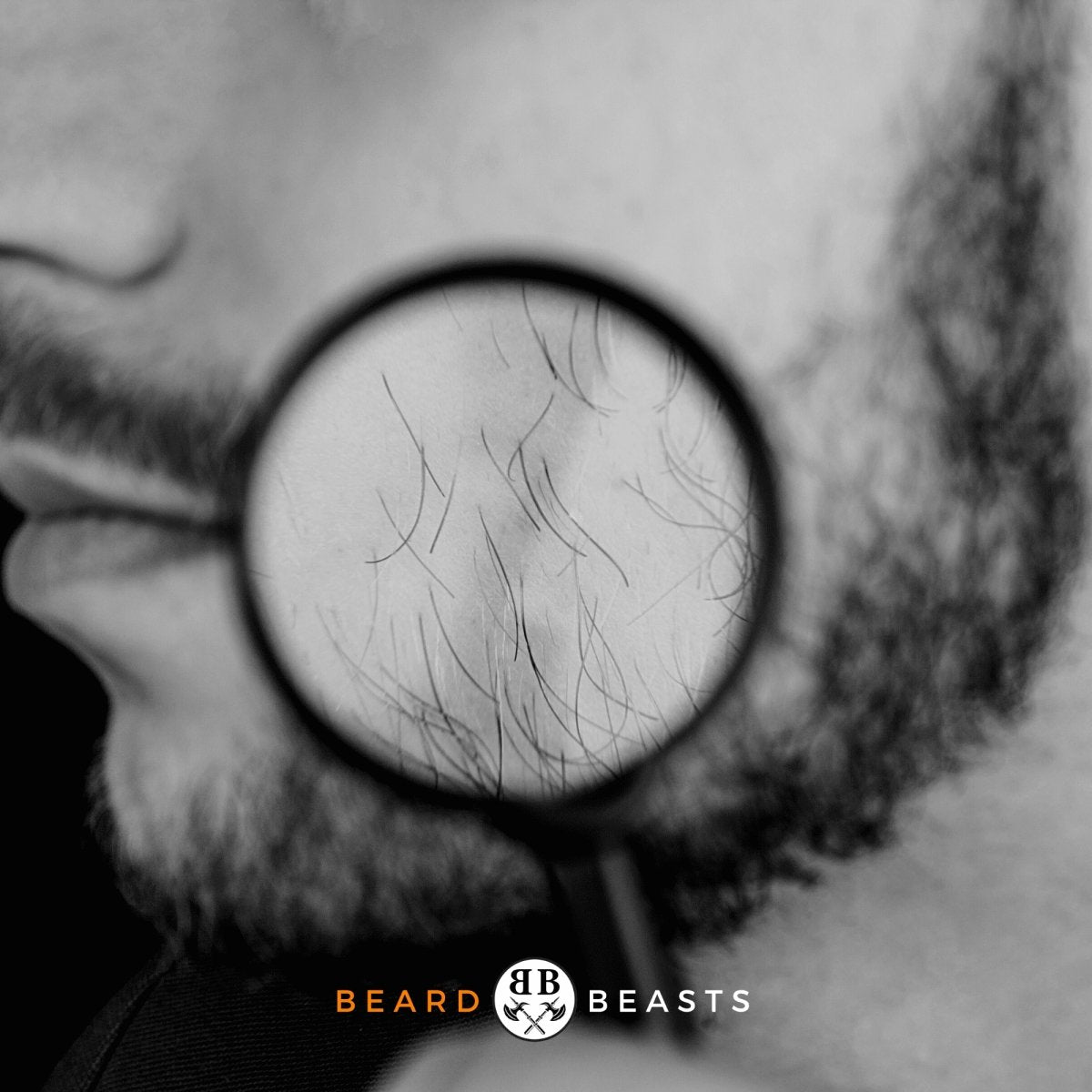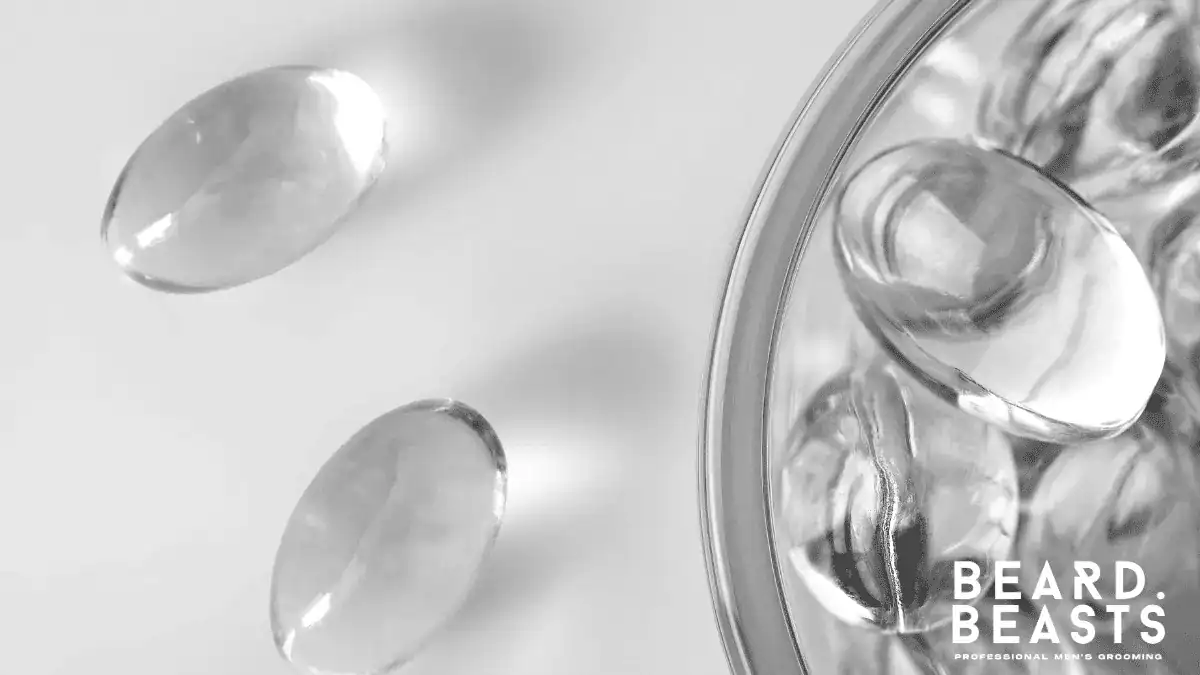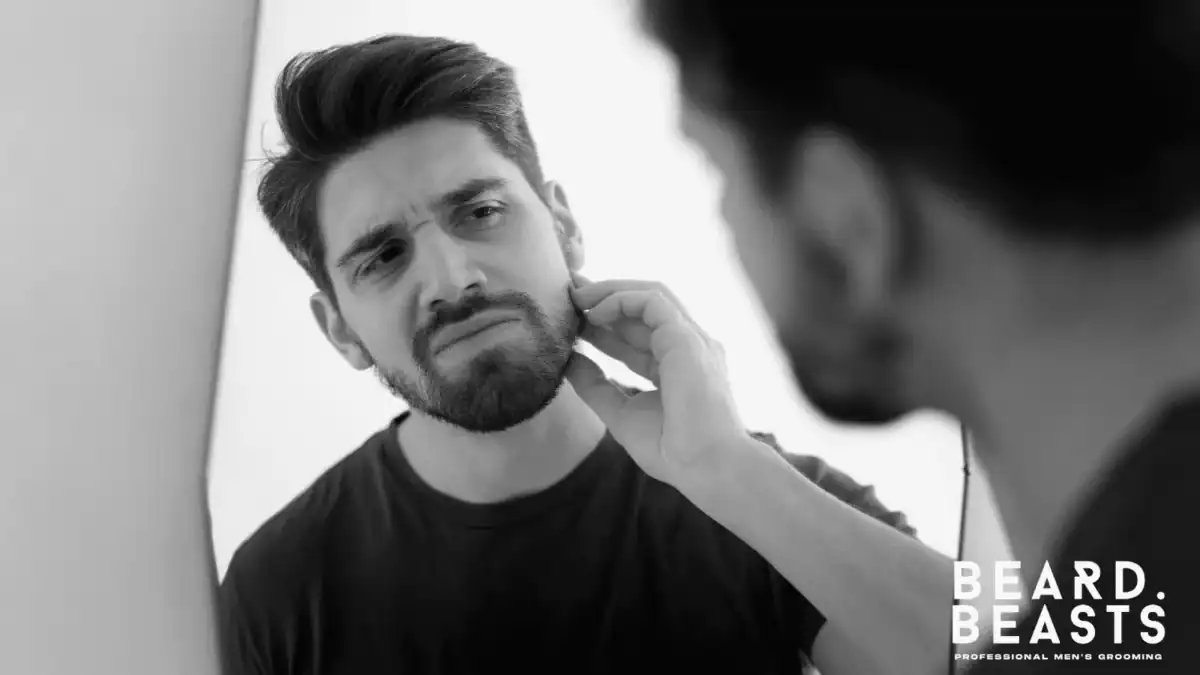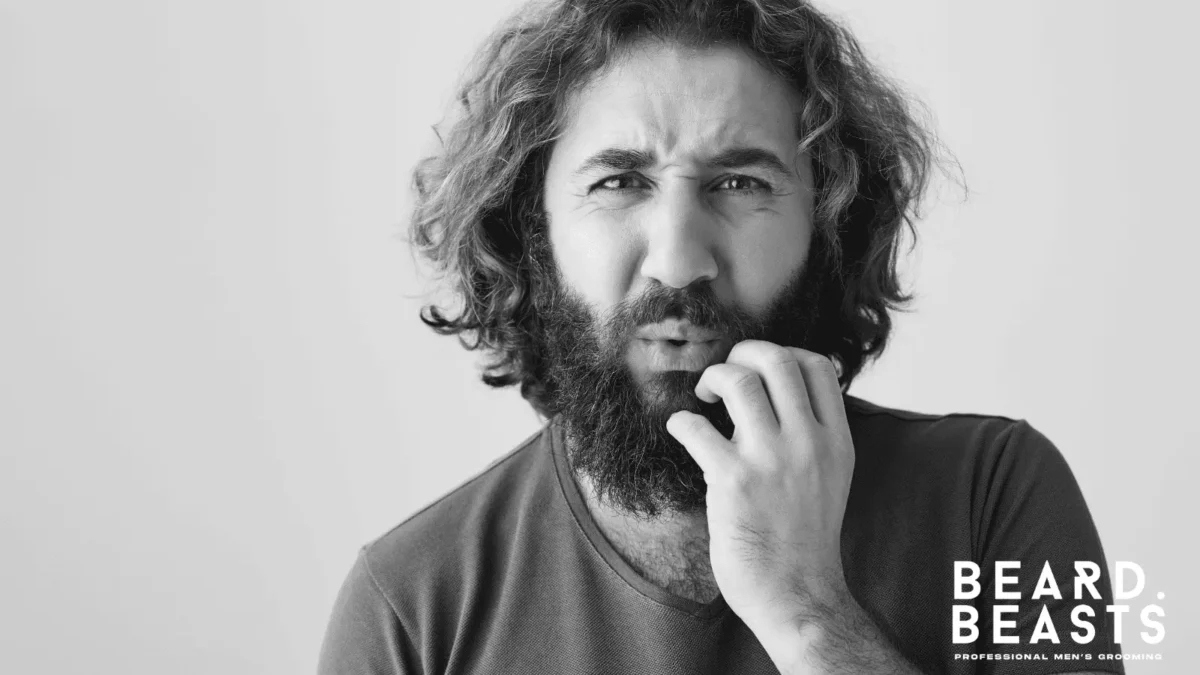Welcome to a world where your beard, a symbol of pride and personality, sometimes faces unexpected challenges. Have you ever noticed your beard hair falling out or experienced beard shedding? You’re not alone. This article dives into the common yet often misunderstood phenomenon of beard hair loss, shedding light on what causes those precious strands to leave your chin and cheeks.
Understanding beard hair loss is crucial, not just for maintaining your suave appearance but for your overall skin and hair health. Whether it’s a few hairs slipping away or a noticeable thinning, getting to the root of beard hair falling out is essential. It’s not just about aesthetics; it’s about being in tune with your body’s signals.
Beard shedding is a natural process, but when does it cross the line from normal to concerning? We’ll explore this fine line, offering insights into the factors that contribute to beard hair loss. From hormonal changes and lifestyle habits to environmental influences, this article unpacks the myriad reasons behind your beard’s health.
Stay with us as we embark on this journey to understand the causes of beard hair loss. You’ll gain not only knowledge but also practical tips to keep your beard in its best form. Let’s turn those worries into wisdom and keep your beard as glorious as it’s meant to be.
What is Beard Hair Loss?
Ever wondered, “Why is my beard hair falling out?” You’re not alone. Beard hair loss is when you lose more hair from your beard than what’s considered normal, leading to thinning or even beard patches. Unlike regular beard shedding, which is a part of the hair’s natural cycle, this is when you lose more hair than what grows back.
Beard hair loss isn’t just about losing a few strands. It can be influenced by various factors, including genetics, hormonal imbalances, lifestyle choices, and environmental conditions. Sometimes, it’s just a temporary phase caused by stress or poor nutrition; other times, it could indicate an underlying health issue.
Understanding why your beard hair is falling out is key. It’s not only about the hair you lose but also about understanding the underlying causes. While beard hair loss can be concerning, it’s often reversible, especially with early detection and proper care. So, knowing about this condition is the first step towards maintaining your beard’s glory.
The Science Behind Beard Shedding
Beard shedding might seem worrisome, but it’s a natural part of your beard’s life cycle. Every hair on your face, just like the hair on your head, goes through a growth cycle that includes shedding. Understanding this cycle can provide peace of mind and help differentiate between normal beard shedding and more concerning beard hair loss.
The Growth Cycle of Beard Hair:
Anagen Phase (Growth Stage): This is when your beard hair actively grows. Lasting anywhere from a few months to several years, the length of this phase determines how long your beard can grow.
Catagen Phase (Transition Stage): A shorter phase, usually lasting a few weeks, where hair stops growing and the hair follicle shrinks.
Telogen Phase (Resting Stage): During this stage, which lasts a few months, the hair doesn’t grow, but it doesn’t fall out either. It’s like the hair is taking a break.
Exogen Phase (Shedding Stage): This is when the old hair falls out, and new hair begins to grow, replacing the old one. This phase marks the start of a new growth cycle.
It’s important to note that at any given time, different hairs are at different stages of this cycle. This means that beard shedding is a continuous process. Seeing some hairs in your sink isn’t necessarily a sign of beard hair loss; it’s often just your beard renewing itself.
However, if you notice excessive beard shedding or areas where the beard doesn’t seem to grow back, that’s when it might be a sign of something more than just the natural cycle. Factors like stress, poor nutrition, and skin conditions can disrupt this cycle, leading to more noticeable beard hair falling out.
So next time you find a few stray beard hairs, remember, it’s usually just part of the cycle. But staying attuned to your beard’s health and changes can help you spot any issues early on, keeping your beard looking its best.
Common Causes of Beard Hair Loss
When it comes to the health of your beard, various factors play a role. Understanding these can help you better manage or even prevent unwanted beard hair loss. Let’s explore some of the common causes:
Hormonal Imbalances
Hormones, especially testosterone and its derivative dihydrotestosterone (DHT), are pivotal in beard growth. Testosterone lays the groundwork for facial hair during puberty, while DHT promotes the density and thickness of your beard. However, an imbalance in these hormones can lead to beard hair loss. Too much DHT, for instance, can shrink hair follicles and shorten the growth phase, causing the beard to thin or leave bald patches. This hormonal tug-of-war is a delicate balance, crucial for maintaining a healthy beard.
Nutritional Deficiencies
Just like the rest of your body, your beard needs the right nutrients to thrive. Deficiencies in vitamins and minerals, particularly biotin, iron, and vitamins D and E, can hamper beard growth. A balanced diet rich in these nutrients is essential for maintaining healthy hair follicles and preventing beard hair from falling out. Remember, a healthy beard starts from the inside!
Skin Conditions
The health of your skin is directly linked to the health of your beard. Conditions like Alopecia Areata, an autoimmune disorder, can cause patchy hair loss, including on the beard. Other skin issues like dermatitis, fungal infections, or psoriasis can also lead to beard shedding by affecting the hair follicles. Good skin care, therefore, is not just about appearance; it’s a critical component in maintaining a lush beard.
Poor Grooming Practices
Finally, how you care for your beard can significantly impact its health. Over-grooming with harsh products or tools can damage hair follicles, leading to hair loss. Similarly, under-grooming can lead to a buildup of dirt and oils, which can also cause beard shedding. The key is to find a beard care routine that’s just right, one that keeps your beard clean and conditioned without going overboard.
In summary, the journey to understanding and preventing beard hair loss involves a holistic look at your lifestyle, from hormonal health to diet, skin care, and grooming practices. By being aware of these factors, you can take proactive steps to ensure your beard remains as full and healthy as possible.
Environmental Factors Contributing to Beard Hair Falling Out
The world around us has a more significant impact on our beard health than we often realize. External environmental factors can be silent culprits behind beard hair falling out. Let’s dive into how elements like weather and pollution can affect your beard.
Impact of Weather Conditions
Sun Exposure: Just like your skin, your beard needs protection from the sun. Excessive sun exposure can weaken hair fibers, leading to beard hair loss. It’s not just about avoiding a sunburn; it’s about shielding your beard from UV rays that can break down hair proteins.
Cold and Dry Climates: Cold weather, especially when it’s dry, can strip moisture from your beard, making the hair brittle and more prone to breaking. This dryness isn’t just uncomfortable; it can lead to increased beard shedding.
Humidity: On the flip side, high humidity can make your beard hair frizzy and more difficult to manage. While it doesn’t directly cause hair to fall out, it can lead to more aggressive grooming practices, which, in turn, can cause beard hair loss.
Pollution and Environmental Toxins
The air we live in is filled with pollutants that can affect beard hair health. Smoke, dust, and other airborne pollutants can settle in your beard, leading to irritation and damage to hair follicles. This constant exposure can weaken the hair, making it prone to falling out. It’s like a slow assault on your beard, one that can be mitigated with proper cleansing and care.
Preventive Measures
- Sun Protection: Use beard products with sun protection or wear a hat on sunny days to shield your beard from harmful UV rays.
- Moisturizing: In dry and cold conditions, keep your beard well-moisturized with beard oil or balms to prevent dryness and brittleness.
- Regular Cleansing: To combat the effects of pollution, cleanse your beard regularly with a nourishing beard wash designed for facial hair.
By understanding and addressing these environmental factors, you can take active steps to protect your beard. It’s about adapting your beard care routine to your environment, ensuring that your facial hair stays as healthy and strong as the personality it represents.
Psychological Factors and Stress: The Hidden Impact on Beard Growth & Beard Shedding
It’s not just physical factors that influence beard growth and health; your mental well-being plays a crucial role too. Stress and psychological factors can significantly impact your beard, leading to issues like beard hair loss and increased beard shedding. Let’s explore how your mental state can affect the health of your beard.
Stress and Its Effects on Beard Health
Stress, whether acute or chronic, can wreak havoc on your body, and your beard is no exception. When you’re stressed, your body goes into a ‘fight or flight’ mode, releasing stress hormones like cortisol. These hormones can disrupt the normal hair growth cycle, leading to beard hair falling out. Stress can also cause your hair follicles to prematurely enter the ‘telogen’ phase, where hair stops growing and eventually falls out.
The Psychological Side of Beard Grooming
Your mental health also influences how you care for your beard. During stressful times, you might neglect your grooming routine, leading to under-grooming, which can exacerbate beard shedding. On the other hand, stress might lead to over-grooming – like excessive brushing or styling – which can also contribute to beard hair loss.
How to Manage Stress for Beard Health
Regular Exercise: Physical activity is a great way to reduce stress. It doesn’t have to be intense; even a daily walk can help.
Mindfulness and Relaxation: Techniques like meditation, deep breathing, or yoga can help calm your mind and reduce stress levels.
Balanced Lifestyle: Ensure you’re getting enough sleep and maintaining a healthy diet. A well-rested and well-nourished body copes better with stress.
Healthy Grooming Habits: Stick to a consistent but not excessive grooming routine. This includes using the right beard care products and not overdoing it with styling tools.
Seek Professional Help: If stress becomes overwhelming, don’t hesitate to seek help from a mental health professional.
Understanding the link between stress, mental health, and beard growth is key to addressing beard hair loss. By taking care of your mental well-being, you’re also taking steps to keep your beard at its best. Remember, a healthy mind contributes to a healthy beard!
Medical Conditions and Medications: Unseen Contributors to Beard Hair Loss
While we often focus on external factors affecting beard health, it’s important to remember that internal health issues, including medical conditions and medications, can also play a significant role in beard hair loss. Let’s delve into how certain health conditions and medications can influence your beard’s wellbeing.
Medical Conditions Affecting Beard Growth
Thyroid Disorders: Both hypothyroidism (underactive thyroid) and hyperthyroidism (overactive thyroid) can lead to hair thinning, including in the beard area. The thyroid gland plays a crucial role in regulating your body’s metabolism, which includes hair growth and regeneration.
Autoimmune Diseases: Conditions like Alopecia Areata, where the immune system attacks hair follicles, can cause patchy beard hair loss. This unpredictable condition can lead to complete hair loss in some areas while leaving others unaffected.
Hormonal Imbalances: Conditions that affect hormone levels, like hypogonadism, can result in reduced beard growth due to lowered testosterone levels.
Anemia and Other Nutritional Disorders: Lack of essential nutrients, often seen in various forms of anemia, can lead to weakened hair growth and increased beard shedding.
Medications That Can Cause Beard Hair Loss
Several medications can have the side effect of hair loss, which includes beard hair. Some common culprits include:
Anticoagulants (Blood Thinners): Drugs like warfarin and heparin can lead to increased hair shedding.
Antidepressants and Anxiety Medications: Certain drugs used for mental health treatment can have hair loss as a side effect.
Chemotherapy Drugs: These medications are known for causing hair loss all over the body, including the beard.
Antihypertensive Drugs: Medications for blood pressure, like beta-blockers, can also contribute to hair loss.
It’s essential to understand that if you’re experiencing beard hair loss and are on medication or have a medical condition, the two might be related. However, it’s crucial not to stop or change your medication without consulting your doctor. Often, there are alternatives or ways to manage this side effect.
In conclusion, being aware of the internal factors, like medical conditions and medications, that contribute to beard hair loss is key to addressing and managing the issue. Regular check-ups and open conversations with your healthcare provider can help in identifying and mitigating these internal causes, keeping your beard as healthy as possible. Remember, your beard’s health is a reflection of your overall health.
Age-Related Changes: How Aging Affects Beard Hair
As we journey through life, our bodies undergo various changes, and our beards are no exception. Aging naturally impacts hair growth and health, including that of your beard. Understanding these age-related changes can help you better care for your beard as you grow older.
The Aging Process and Beard Hair
Thinning Hair: Just as the hair on your head tends to thin with age, so does your beard. You might notice your beard becoming less dense or patches where hair doesn’t grow as thickly as it used to. This is a normal part of aging, as hair follicles shrink and produce finer hair.
Change in Hair Texture: With age, your beard hair might become coarser or wirier. This change in texture is due to reduced oil production in the skin, making hair feel rougher.
Slower Hair Growth: As you age, the rate of hair growth can slow down. This means your beard might not grow as quickly as it did in your younger years.
Graying Beard: Graying is perhaps the most visible sign of aging in your beard. Hair color is produced by melanin, and as we age, the production of melanin decreases, leading to gray or white hair.
Adapting Beard Care with Age
Gentle Grooming: As your beard hair becomes finer and more fragile, it’s important to use gentle grooming techniques. Avoid harsh brushing and opt for softer beard brushes or combs.
Moisturize Regularly: With reduced natural oil production, keeping your beard moisturized becomes even more important. Use quality beard oils or balms to keep your beard soft and healthy.
Embrace the Gray: Graying is a natural and dignified part of aging. Embrace your gray beard; it’s a sign of your life’s journey and experience.
Regular Trims: Keeping your beard neatly trimmed using a quality beard trimmer can help manage changes in texture and density, making your beard look fuller and more uniform.
Age and Beard Health
While age-related changes to your beard are inevitable, they don’t have to mean the end of a healthy, attractive beard. By understanding and adapting to these changes, you can keep your beard looking great at any age. Aging might change the characteristics of your beard, but with the right care and attitude, your beard can continue to be a defining feature of your persona. Remember, a well-cared-for beard is a timeless asset.
Myths vs. Facts: Debunking Common Myths About Beard Hair Loss
Beard hair loss is a topic surrounded by numerous myths and misconceptions. It’s time to separate fact from fiction and clear up some common misunderstandings about what affects the health and growth of your beard.
Myth 1: Shaving Makes Your Beard Grow Back Thicker and Faster
- Fact: This is a classic myth. Shaving does not affect the thickness or the growth rate of your beard. When you shave, you’re simply cutting the hair at the surface of your skin. The perceived thickness is due to the blunt ends of the hair after shaving, which make it feel more coarse as it grows out.
Myth 2: Beard Hair Loss is Always a Sign of Aging
- Fact: While aging can lead to changes in beard density and texture, beard hair loss can happen at any age. Factors like stress, hormonal imbalances, and nutrition play a significant role in beard health, irrespective of age.
Myth 3: The More You Brush Your Beard, the Less It Will Shed
- Fact: Gentle grooming is beneficial for your beard, but excessive brushing can actually cause damage. Over-brushing can lead to breakage and can exacerbate beard shedding. It’s about finding a balance in your grooming routine.
Myth 4: Beard Oils and Balms Can Prevent Beard Hair Loss
- Fact: While beard oils and balms are excellent for moisturizing the skin and making the beard softer, they don’t directly prevent beard hair loss. They can, however, create a healthier environment for hair growth by nourishing the skin beneath.
Myth 5: Only Older Men Experience Beard Hair Loss
- Fact: Beard hair loss doesn’t discriminate by age. Young men can also experience beard hair falling out due to various reasons, including stress, hormonal changes, and lifestyle factors.
Myth 6: If Your Beard is Falling Out, It’s Permanent
- Fact: Not all cases of beard hair loss are permanent. Depending on the cause, it can be a temporary condition. With proper care and addressing underlying issues, it’s often possible to regain full beard growth.
Understanding the truth behind these myths helps you take a more informed approach to caring for your beard. Remember, every beard is unique, and what works for one person may not work for another. The key to a healthy beard is understanding your own beard’s needs and taking care of it accordingly.
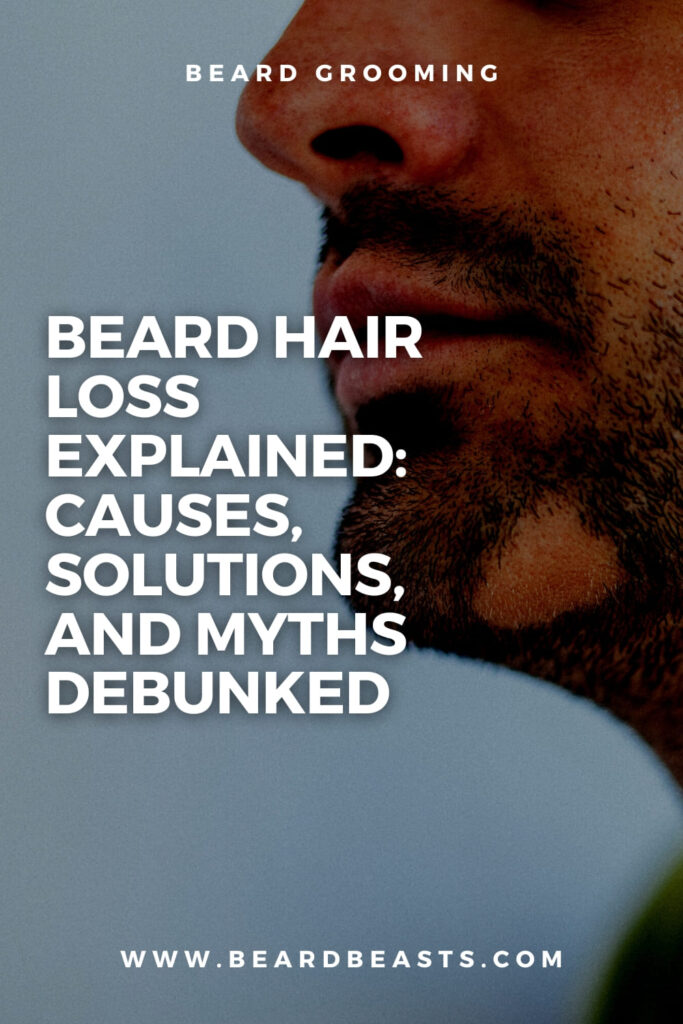
Conclusion: Embracing and Understanding Your Beard’s Journey
As we come to the end of our exploration into the world of beards, it’s clear that beard hair loss, and beard shedding are multifaceted issues influenced by a myriad of factors. From hormonal imbalances and nutritional deficiencies to environmental impacts and stress, the health of your beard is a reflection of various aspects of your lifestyle and wellbeing.
Key Takeaways:
- Beard Health is Multidimensional: Beard hair loss is not just about genetics; it’s influenced by diet, grooming habits, stress levels, and environmental factors.
- Importance of Balance: Hormonal balances, proper nutrition, and a balanced grooming routine are crucial for a healthy beard.
- Environmental Awareness: External factors like weather and pollution do play a role in the health of your beard.
- Mental Health Matters: Stress and psychological well-being significantly impact the growth and health of your beard.
- Medical Insight: Certain medical conditions and medications can contribute to beard hair loss.
- Aging Gracefully: Age-related changes are natural, and understanding them can help in adapting your beard care routine.
- Dispelling Myths: It’s important to separate facts from myths to properly care for your beard.
Remember, experiencing changes in your beard’s health is not uncommon, and often, these issues can be addressed with the right approach. However, if you’re facing persistent problems or noticing significant beard hair loss, it might be time to seek professional advice. Consulting a dermatologist or a trichologist can provide you with tailored advice and treatment options, ensuring that your beard receives the care it needs.
Your beard is more than just facial hair; it’s a symbol of your identity and a reflection of your internal health. By understanding the complexities behind beard care and embracing the journey, you can ensure that your beard remains a source of pride and confidence. Remember, every beard has its own story, and with the right care and attention, yours can continue to tell yours for years to come.

